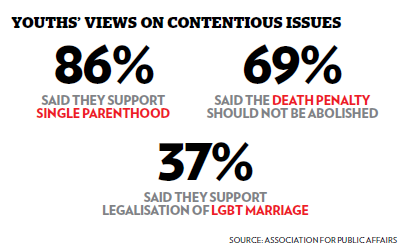SINGAPORE — Youth leaders were also polled via a Google survey on their attitude towards issues that are deemed controversial.
This was done last July at the Dream Future Forum organised by the Association for Public Affairs at the Lee Kuan Yew School of Public Policy, and about 300 of them who took part were from junior colleges, polytechnics, universities and the Institute of Technical Education, or were young working adults.
The results of the survey, released in the Dream Future Report by the association, showed that 86 per cent of them were in favour of giving single parents the same level of support as married couples, while 37 per cent of them believed that Singapore should legalise LGBT (lesbian, gay, bisexual and transgender) marriages.
Three in 10 believed Singapore should allow multiple citizenship, while nearly seven in 10 (69 per cent) supported the death penalty, and about 74 per cent supported caning.
Eight in 10 (81 per cent) were interested in politics, but nine in 10 (91 per cent) did not feel they knew a great deal about it.
On the most effective method of influencing decision-making, 93 per cent agreed that it was through voting in an election, while 83 per cent said that it was policy consultations.
For 76 per cent of the respondents, it was contacting a Member of Parliament.
Nearly seven in 10 respondents (66 per cent) were confident in the political system, such that they would get involved in the country’s politics and change the way Singapore is run.
Nine in 10 were willing to be involved in national decision-making, but 93 per cent felt that they had some, not very much, or no influence over national decision-making.
On what they felt would be the essential traits of a good citizen, 89 per cent said that being informed about current affairs was very important or essential, and only 20 per cent felt that joining a political party was very important or essential.
However, when surveyed on their interest in current affairs, the highest proportion of respondents were keen on international issues (40 per cent), followed by national issues (33 per cent) and community issues (21 per cent).
A mere 6 per cent were interested in regional issues, “signalling a gross apathy for Singapore’s immediate region”, the report stated.





